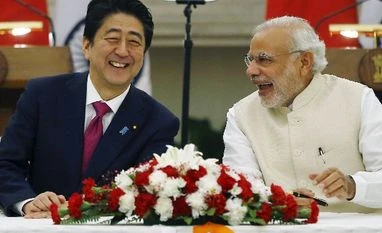Prime Minister Narendra Modi welcomed the 'Japan-India Make-in-India Special Finance Facility' of up to 1.5 trillion yen by Nippon Export and Investment Insurance and Japan Bank for International Cooperation, a joint statement issued after the meeting between Modi and Japanese Prime Minister Shinzo Abe said today.
This aims at promoting direct investment from Japan to India and to support their business activities with counterparts in India, including development of necessary infrastructure, and to help materialise 'Make-in-India', it said.
It said that Prime Minister Abe expressed his expectation on further enhancement of reform measures including in the financial sector.
"The two Prime Ministers decided to deepen mutual cooperation regarding the Make-in-India policy," it said.
The two sides also reaffirmed the "intention to develop 'Japan Industrial Townships (JIT)', with investment incentive for companies that would not be lower than under the prevailing policy framework such as SEZ, and National Investment and Manufacturing Zone," it added.
"Moreover, both sides will work toward evolving special packages for attracting Japanese investment in the JIT in India," the statement said.
Both countries also welcomed the progress in the flagship projects such as the Western Dedicated Freight Corridor, and reaffirmed the determination to expedite the Delhi-Mumbai Industrial Corridor (DMIC) projects.
India and Japan further concurred to take the Chennai-Bengaluru Industrial Corridor project to the next stage of concrete implementation including by utilising official development assistance (ODA) loan schemes and other facility measures.
"Indian side expressed a hope to attract $5.5 billion of investment and other support," it said.
Recognising the important role played by Japan's ODA, the two sides hoped that the total commitment of Japanese ODA yen loan to India in 2015-16 may reach around 400 billion yen, the highest ever provided to India, it said.
Prime Minister Abe expressed Japan's intention to provide ODA loans for the improvement of road network connectivity in northeastern states of India, the peripheral ring road surrounding Bengaluru, and the horticulture irrigation in Jharkhand.
)